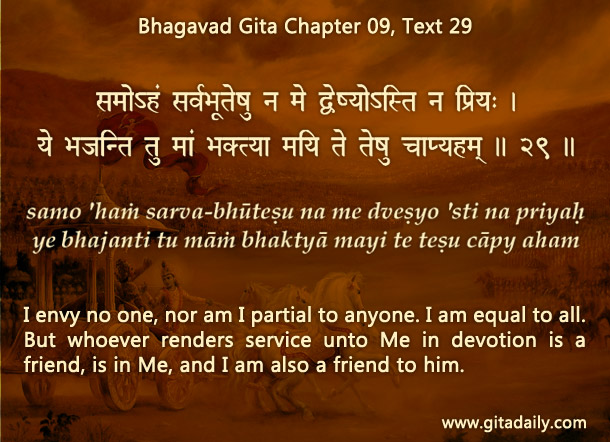How Krishna is both impartial and reciprocal – Suppose a cricket umpire constantly rules in favor of one side. That’s unfair, we will exclaim. We often extend this expectation of impartiality to all authority figures, including the Supreme Lord. Pertinently, Krishna declares in the Gita that he is equal to all (09.29); he doesn’t arbitrarily favor or disfavor anyone.
Suppose we are closely connected with an authority figure, as in the case of a parent, a coach or a spiritual mentor. In such relationships, we expect our authorities to be impartial but not impersonal; we don’t want them to be like an unfeeling machine flashing signs of green and red when we do something good and bad respectively. If we work hard and do well, we want them to warmly appreciate and encourage. In fact, it’s our capacity as conscious beings to reciprocate with others that makes relationships possible and relishable. Pertinently, Gita wisdom explains that Krishna is not just an impartial judge, but also a personal coach. That’s why he is not just neutral but also reciprocal.
The same verse (09.34) that asserts Krishna’s impartiality also emphasizes, in its second half, his reciprocity: he offers special love to those who offer him special love. Krishna’s nature is demonstrated later in his declaration that he personally delivers those who devote themselves to him in his personal form (12.07). This contrasts with those who meditate on his impersonal manifestation instead of his personal form; he reciprocates with their desire to turn away from him by respecting their free will and not forcing himself into their lives.
What does Krishna’s reciprocity mean in the battlefield context? When Arjuna chooses to fight as a devotional service to Krishna, he will have Krishna’s personal protection, guidance and empowerment.
One-sentence summary:
Krishna is impartial but not impersonal: as a cosmic judge, he doesn’t favor anyone arbitrarily; yet as a personal coach, he reciprocates with those who devote themselves to him.
Think it over:
- What’s wrong with a guide being merely impartial?
- What two roles does Krishna play? How are his dispositions different in those two roles?
- How does the Gita demonstrate Krishna’s reciprocity?
***
09.29: I envy no one, nor am I partial to anyone. I am equal to all. But whoever renders service unto Me in devotion is a friend, is in Me, and I am also a friend to him.
To know more about this verse, please click on the image


Devote Krishna to guide LIFE